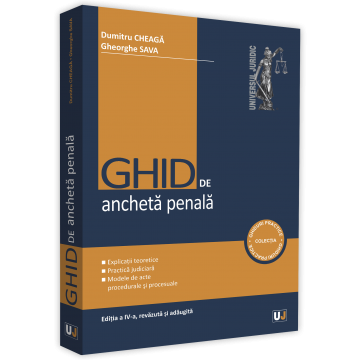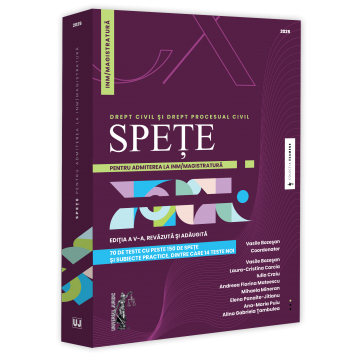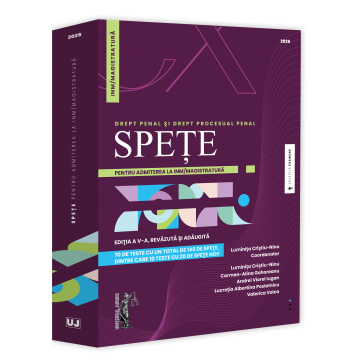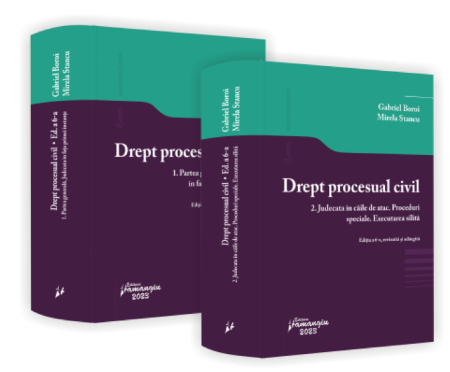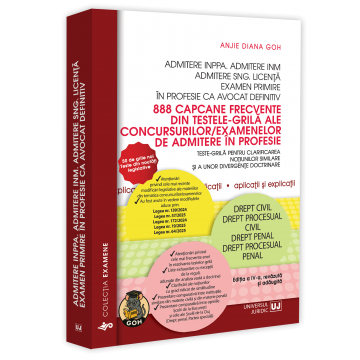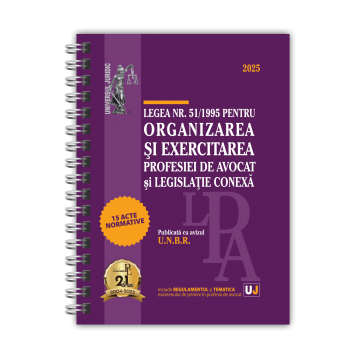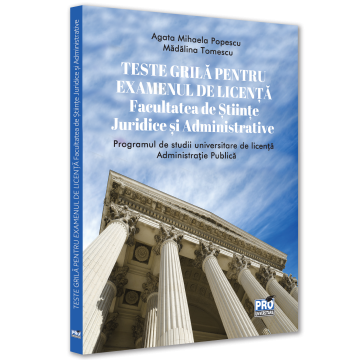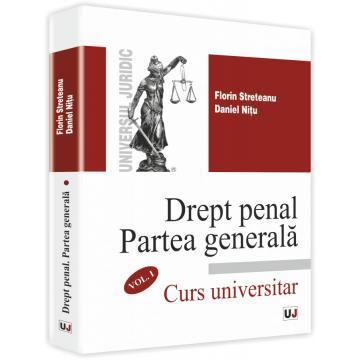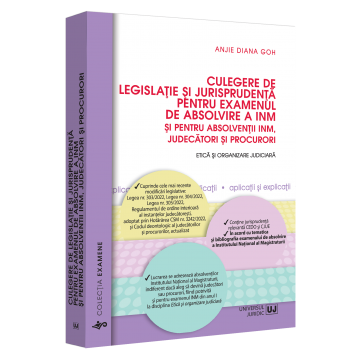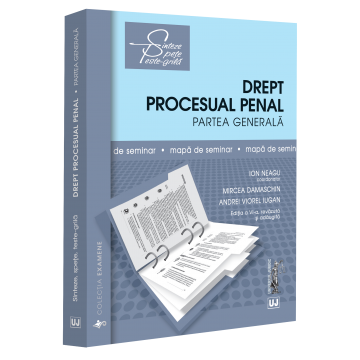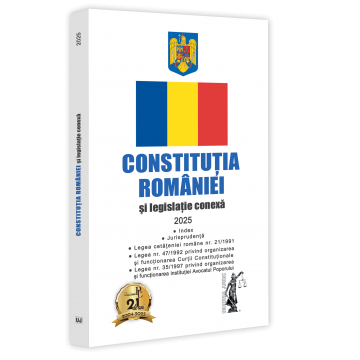Manuscript proposals: [email protected] / 0745 204 115 //// Tracking orders Individuals / Sales: 0745 200 357 / Orders Legal entities: 0721 722 783
 Civil law manual. General theory of obligations. Course notes. Grid Tests - Adrian Stoica, Grigore-Valentin Beleniuc
Civil law manual. General theory of obligations. Course notes. Grid Tests - Adrian Stoica, Grigore-Valentin Beleniuc

Publisher: Universul Juridic
Author: Adrian Stoica, Valentin Beleniuc
Pages: 334
Publisher year: 2019
ISBN: 978-606-39-0415-8
Product Code:
9786063904158
Do you need help?
0745 200 357
- Description
- Download (1)
- Authors
- Content
- More details
- Reviews (0)
The manual of the general theory of obligations that we preface includes the course notes and grid tests prepared by Adrian Stoica and Valentin Beleniuc - university teachers at the Faculty of Law of the "Ovidiu" University of Constanta -, developed based on a well-prepared plan , related to the exigencies of a university course and to its direct recipients, students and, less, master students or doctoral students.
It is known that the matter of obligations, the backbone of civil law, is distinguished by special technicality, impeccable legal logic and a high degree of abstraction, which makes it difficult to study, especially in the first years of license, when stepping into the mysteries of law civil, in which the law of obligations is one of the keys to the vault.
In this context and in the light of the New Civil Code, which unified, it is known, the matter of civil and commercial obligations (cf. M. Nicolae, Unification of the law of civil and commercial obligations, Ed. Universul Juridic, Bucharest, 2015), the authors proposed to treat briefly, but clearly, the fundamental elements of the general theory of obligations, respectively the notion of civil obligation, the sources of obligations (mainly the contract, but also the unilateral civil legal act as a source of obligations, the lawful legal fact generating obligations - business management, undue payment, enrichment without just cause - and the illicit act generating damages - known rather as tortious civil liability), execution of obligations, transmission and transformation of obligations, settlement of obligations, obligations affected by modalities and plural obligations, including guarantee obligations.
There are also comparative references to the recent French reform of the law of obligations and contracts, operated by Government Ordinance no. 2016-131 of February 10, 2016, highlighting the fact that between the two regulations there are enough common points, in full agreement with the European projects for the unification of private law, within a European civil code [cf. The principles of European contract law (Lando), the common reference draft (von Bar)], likely to contribute to the formation or, at least, to lay the foundations of a novum ius civile Europæum.
The manual, as it results from its title, also includes a consistent and extremely useful set of grid tests, grouped on the main institutions of obligations, tests that allow students to verify their knowledge in a direct and quick self-assessment, without resorting to other manuals or works specially designed for this purpose.
In conclusion, hoping that this textbook will be positively received by those to whom it is addressed, we wish the authors to continue their research on such a fascinating and always challenging subject of obligations and, based on the results obtained, to complete and enrich it in future editions, so that it becomes a useful working tool not only for students, but also for master's and doctoral students, including law practitioners.
Product compliance information
It is known that the matter of obligations, the backbone of civil law, is distinguished by special technicality, impeccable legal logic and a high degree of abstraction, which makes it difficult to study, especially in the first years of license, when stepping into the mysteries of law civil, in which the law of obligations is one of the keys to the vault.
In this context and in the light of the New Civil Code, which unified, it is known, the matter of civil and commercial obligations (cf. M. Nicolae, Unification of the law of civil and commercial obligations, Ed. Universul Juridic, Bucharest, 2015), the authors proposed to treat briefly, but clearly, the fundamental elements of the general theory of obligations, respectively the notion of civil obligation, the sources of obligations (mainly the contract, but also the unilateral civil legal act as a source of obligations, the lawful legal fact generating obligations - business management, undue payment, enrichment without just cause - and the illicit act generating damages - known rather as tortious civil liability), execution of obligations, transmission and transformation of obligations, settlement of obligations, obligations affected by modalities and plural obligations, including guarantee obligations.
There are also comparative references to the recent French reform of the law of obligations and contracts, operated by Government Ordinance no. 2016-131 of February 10, 2016, highlighting the fact that between the two regulations there are enough common points, in full agreement with the European projects for the unification of private law, within a European civil code [cf. The principles of European contract law (Lando), the common reference draft (von Bar)], likely to contribute to the formation or, at least, to lay the foundations of a novum ius civile Europæum.
The manual, as it results from its title, also includes a consistent and extremely useful set of grid tests, grouped on the main institutions of obligations, tests that allow students to verify their knowledge in a direct and quick self-assessment, without resorting to other manuals or works specially designed for this purpose.
In conclusion, hoping that this textbook will be positively received by those to whom it is addressed, we wish the authors to continue their research on such a fascinating and always challenging subject of obligations and, based on the results obtained, to complete and enrich it in future editions, so that it becomes a useful working tool not only for students, but also for master's and doctoral students, including law practitioners.
Marian NICOLAE
-
Civil law manual. General theory of obligations. Course notes. Grid Tests - Adrian Stoica, Grigore-Valentin Beleniuc
Download
Adrian Stoica
- 2015 present: University Professor at the "Ovidius" University of Constanta, Faculty of Law and Administrative Sciences
- 2016 present: Dean of the Faculty of Law and Administrative Sciences, "Ovidius" University of Constanta
- 2006 present: Deputy Treasurer, Secretary of the International Union of Bailiffs, currently, Permanent Consultant of the Executive Bureau of the International Union of Bailiffs
- 1999 present: bailiff
- The title of the doctoral thesis: "Forced execution of real estate", coordinator prof. Univ. Dr. Ioan Les
- articles published in national and international specialized magazines or books published at national / international publishing houses
Grigore-Valentin Beleniuc
- doctor of law from 2018, the qualification - “Magna cum laude”, University of Craiova, Faculty of Law, with the doctoral thesis entitled “Maintenance contract”, under the coordination of prof. Univ. Dr. Sevastian Cercel;
- lawyer since 2014, in the Constanta Bar;
- assistant professor at the Faculty of Law and Administrative Sciences within the "Ovidius" University of Constanta, in the disciplines at the seminar: Civil Law. Special contracts, Civil law. Real rights, European competition law, Organization of the judiciary and the legal professions.
Publishing activity:
- Grigore Valentin Beleniuc, Maintenance Contract, Universul Juridic Publishing House, Bucharest, 2019;
- Adrian Stoica, Grigore Valentin Beleniuc, Civil Law Manual. General theory of obligations. Course Note. Grid tests, Universul Juridic Publishing House, Bucharest, 2019;
- author or co-author of over 10 papers / articles published in specialized magazines.
- 2015 present: University Professor at the "Ovidius" University of Constanta, Faculty of Law and Administrative Sciences
- 2016 present: Dean of the Faculty of Law and Administrative Sciences, "Ovidius" University of Constanta
- 2006 present: Deputy Treasurer, Secretary of the International Union of Bailiffs, currently, Permanent Consultant of the Executive Bureau of the International Union of Bailiffs
- 1999 present: bailiff
- The title of the doctoral thesis: "Forced execution of real estate", coordinator prof. Univ. Dr. Ioan Les
- articles published in national and international specialized magazines or books published at national / international publishing houses
Grigore-Valentin Beleniuc
- doctor of law from 2018, the qualification - “Magna cum laude”, University of Craiova, Faculty of Law, with the doctoral thesis entitled “Maintenance contract”, under the coordination of prof. Univ. Dr. Sevastian Cercel;
- lawyer since 2014, in the Constanta Bar;
- assistant professor at the Faculty of Law and Administrative Sciences within the "Ovidius" University of Constanta, in the disciplines at the seminar: Civil Law. Special contracts, Civil law. Real rights, European competition law, Organization of the judiciary and the legal professions.
Publishing activity:
- Grigore Valentin Beleniuc, Maintenance Contract, Universul Juridic Publishing House, Bucharest, 2019;
- Adrian Stoica, Grigore Valentin Beleniuc, Civil Law Manual. General theory of obligations. Course Note. Grid tests, Universul Juridic Publishing House, Bucharest, 2019;
- author or co-author of over 10 papers / articles published in specialized magazines.
Content
List of abbreviations / 5
Chapter I
GENERAL INFORMATION ON OBLIGATIONS IN THE CIVIL LAW SYSTEM / 9
Definition of obligations and structure of the legal relationship of obligation / 9
Short considerations regarding the classification of obligations / 14
Chapter II
THE CONTRACT, THE MAIN SOURCE OF OBLIGATIONS / 20
Short considerations on the contract as a source of obligations. Definition and principles incidental to the contract / 20
Classification of contracts / 23
Express classification of contracts according to NCC / 23
Default classification of some contracts, according to NCC / 30
Other classifications of civil contracts / 33
Conclusion of contracts / 34
The essential conditions for the valid conclusion of a contract / 35
The relative conditions required for the valid conclusion of a contract / 44
Nullity. Causes, effects of nullity and validation of the contract in case of nullity / 50
Interpretation of contracts / 53
Effects of contracts / 55
Contract exceptions / 63
Contractual liability and remedies for non - performance of the contract / 68
Contractual liability / 68
Introductory aspects regarding the contractual liability in the New Civil Code / 68
Specific conditions for attracting contractual liability / 70
Remedies for non - performance of the contract / 75
Generalities regarding the institution of remedies for non-execution of contracts / 75
Principles corresponding to the invocation of non - execution remedies / 75
Enumeration of non-execution remedies according to the new Civil Code / 78
Chapter III
OTHER MAIN SOURCES OF OBLIGATIONS UNDER THE NEW CIVIL CODE / 80
Generalities on other main sources of obligations, according to
New Civil Code / 80
The unilateral legal act as a source of obligations / 80
Synthetic considerations regarding the unilateral legal act / 80
Unilateral legal acts considered as sources of obligations / 82
The lawful legal fact generating obligations / 83
Generalities regarding the legal legal fact / 83
Business management (managing the interests of another person) / 85
Undue payment / 91
Enrichment without just cause / 95
Illicit act generating damages (tortious civil liability) / 98
Introductory considerations / 98
Attracting civil liability and exonerating causes of civil liability provided by law / 101
Attracting civil liability / 102
Exempt cases of civil liability provided by law / 114
Liability for one's own deed / 116
Liability for the deed of another person / 118
Liability for damage caused by things, animals or the ruin of the building / 123
Reparation of damage in case of tortious civil liability / 129
Chapter IV
PERFORMANCE OF OBLIGATIONS / 137
Terminological delimitations regarding the execution of obligations / 137
Plata / 138
Enforcement of obligations / 145
Measures preceding the forced execution of obligations. Delay of the debtor / 146
Direct enforcement (in kind) of obligations / 148
Indirect enforcement (by equivalent) of obligations / 151
Resolution, termination and reduction of contractual benefits, civil sanctions in case of culpable non-performance of contractual obligations / 152
Justified causes of non-execution of contractual obligations / 155
Means of protection of creditors 'rights over the debtor' s patrimony / 158
Brief considerations regarding the means of protection of creditors over the debtor 's patrimony / 158
Conservative and precautionary measures / 158
Oblique action / 160
Revocation action (pauliana) / 162
Chapter V
TRANSMISSION AND TRANSFORMATION OF OBLIGATIONS / 165
Introductory considerations / 165
Ways of transmitting the obligations / 165
Ways of transforming obligations / 171
Chapter VI
TERMINATION OF OBLIGATIONS / 174
Settlement of obligations by satisfying the creditor's claim / 175
Settlement of obligations by non-realization of the creditor's claim / 178
Chapter VII
OBLIGATIONS AFFECTED BY MODALITIES AND COMPLEX OR PLURAL OBLIGATIONS / 180
Introductory notions / 180
Obligations affected by the modalities / 181
Complex or plural obligations / 184
Chapter VIII
GUARANTEE OF OBLIGATIONS / 189
Terminological aspects regarding the notion of guaranteeing an obligation / 189
Personal guarantees / 190
Privileges and real guarantees / 193
CHOICE TEST
CHAPTER I
GENERAL INFORMATION ON OBLIGATIONS IN THE CIVIL LAW SYSTEM / 203
Definition of obligations and structure of the legal obligation relationship / 203
Brief considerations regarding the classification of obligations / 205
CHAPTER II
THE CONTRACT, THE MAIN SOURCE OF OBLIGATIONS / 207
Short considerations on the contract as a source of obligations. Definition and principles incidental to the contract / 207
Classification of contracts / 209
Conclusion of contracts / 211
The essential conditions for the valid conclusion of a contract / 211
Capacity required for the valid conclusion of a contract / 211
Will required for concluding contracts / 213
Object and cause of the contract / 219
The relative conditions required at the conclusion of a contract / 222
Time and place of conclusion of the contract / 222
Offer to contract / 225
Acceptance of the conclusion of the contract / 226
Form and content of the contract / 227
Nullity. Causes, effects of nullity and validation of the contract in case of nullity / 230
Interpretation of contracts / 235
Effects of contracts / 236
The effects of the contract in the relations between the contracting parties / 236
The effects of the contract in the relations with persons who do not have the quality of contracting parties / 237
Contract exceptions / 238
Exceptions to the principle of contract relativity / 238
Exceptions to the opposability to third parties of the contract (simulation) / 239
Contractual liability and remedies for non - performance of the contract / 241
Contractual liability / 241
Remedies for non - performance of the contract / 242
CHAPTER III
OTHER MAIN SOURCES OF OBLIGATIONS UNDER THE NEW CIVIL CODE / 247
Generalities on other main sources of obligations, according to
New Civil Code / 247
The unilateral legal act as a source of obligations / 249
Synthetic considerations regarding the unilateral legal act / 249
Unilateral legal acts considered as sources of obligations / 250
The lawful legal fact generating obligations / 249
Generalities regarding the legal legal fact / 249
Managing another person 's interests (business management) / 249
Undue payment / 254
Enrichment without just cause / 255
Illicit act generating damages (tortious civil liability) / 256
Introductory considerations / 256
Attracting civil liability and exonerating causes of tortious civil liability provided by law / 257
Attracting civil liability / 257
Exempt cases of civil liability provided by law / 260
Liability for one's own deed / 263
Liability for another person 's deed / 264
Liability for the deed of the minor or of the one placed under interdiction / 264
Liability of the principals for the deed of the presumptions / 266
Liability for damage caused by things, animals or the ruin of the building / 268
Reparation of damage in case of tortious civil liability / 274
CHAPTER IV
EXECUTION OF OBLIGATIONS / 280
Terminological delimitations regarding the execution of obligations / 280
Plata / 283
Enforcement of obligations / 284
Measures preceding the forced execution of obligations. Delay of the debtor / 284
Direct enforcement (in kind) of obligations / 285
Indirect enforcement (by equivalent) of obligations / 286
Resolution, termination and reduction of contractual benefits, civil sanctions in case of culpable non-performance of contractual obligations / 287
Justified causes of non-execution of contractual obligations / 290
Means of protection of creditors 'rights over the debtor' s patrimony / 290
Brief considerations regarding the means of protection of creditors over the debtor 's patrimony / 290
Conservative and precautionary measures / 292
Oblique action / 291
Revocation action / 292
CHAPTER V
TRANSMISSION AND TRANSFORMATION OF OBLIGATIONS / 294
Introductory considerations / 294
Ways of transmitting the obligations / 296
Ways of transforming obligations / 297
CHAPTER VI
TERMINATION OF OBLIGATIONS / 297
Generalities about the settlement of obligations / 297
Settlement of obligations by satisfying the creditor's claim / 297
Settlement of obligations by non-realization of the creditor's claim / 298
CHAPTER VII
OBLIGATIONS AFFECTED BY MODALITIES AND COMPLEX OR PLURAL OBLIGATIONS / 300
Introductory notions / 300
Obligations affected by modalities / 300
Complex or plural obligations / 301
CHAPTER VIII
GUARANTEE OF OBLIGATIONS / 303
Terminological aspects regarding the notion of guaranteeing an obligation / 303
Personal guarantees / 303
Privileges and real guarantees / 304
CORRECT ANSWERS / 307
Bibliography / 323
List of abbreviations / 5
Chapter I
GENERAL INFORMATION ON OBLIGATIONS IN THE CIVIL LAW SYSTEM / 9
Definition of obligations and structure of the legal relationship of obligation / 9
Short considerations regarding the classification of obligations / 14
Chapter II
THE CONTRACT, THE MAIN SOURCE OF OBLIGATIONS / 20
Short considerations on the contract as a source of obligations. Definition and principles incidental to the contract / 20
Classification of contracts / 23
Express classification of contracts according to NCC / 23
Default classification of some contracts, according to NCC / 30
Other classifications of civil contracts / 33
Conclusion of contracts / 34
The essential conditions for the valid conclusion of a contract / 35
The relative conditions required for the valid conclusion of a contract / 44
Nullity. Causes, effects of nullity and validation of the contract in case of nullity / 50
Interpretation of contracts / 53
Effects of contracts / 55
Contract exceptions / 63
Contractual liability and remedies for non - performance of the contract / 68
Contractual liability / 68
Introductory aspects regarding the contractual liability in the New Civil Code / 68
Specific conditions for attracting contractual liability / 70
Remedies for non - performance of the contract / 75
Generalities regarding the institution of remedies for non-execution of contracts / 75
Principles corresponding to the invocation of non - execution remedies / 75
Enumeration of non-execution remedies according to the new Civil Code / 78
Chapter III
OTHER MAIN SOURCES OF OBLIGATIONS UNDER THE NEW CIVIL CODE / 80
Generalities on other main sources of obligations, according to
New Civil Code / 80
The unilateral legal act as a source of obligations / 80
Synthetic considerations regarding the unilateral legal act / 80
Unilateral legal acts considered as sources of obligations / 82
The lawful legal fact generating obligations / 83
Generalities regarding the legal legal fact / 83
Business management (managing the interests of another person) / 85
Undue payment / 91
Enrichment without just cause / 95
Illicit act generating damages (tortious civil liability) / 98
Introductory considerations / 98
Attracting civil liability and exonerating causes of civil liability provided by law / 101
Attracting civil liability / 102
Exempt cases of civil liability provided by law / 114
Liability for one's own deed / 116
Liability for the deed of another person / 118
Liability for damage caused by things, animals or the ruin of the building / 123
Reparation of damage in case of tortious civil liability / 129
Chapter IV
PERFORMANCE OF OBLIGATIONS / 137
Terminological delimitations regarding the execution of obligations / 137
Plata / 138
Enforcement of obligations / 145
Measures preceding the forced execution of obligations. Delay of the debtor / 146
Direct enforcement (in kind) of obligations / 148
Indirect enforcement (by equivalent) of obligations / 151
Resolution, termination and reduction of contractual benefits, civil sanctions in case of culpable non-performance of contractual obligations / 152
Justified causes of non-execution of contractual obligations / 155
Means of protection of creditors 'rights over the debtor' s patrimony / 158
Brief considerations regarding the means of protection of creditors over the debtor 's patrimony / 158
Conservative and precautionary measures / 158
Oblique action / 160
Revocation action (pauliana) / 162
Chapter V
TRANSMISSION AND TRANSFORMATION OF OBLIGATIONS / 165
Introductory considerations / 165
Ways of transmitting the obligations / 165
Ways of transforming obligations / 171
Chapter VI
TERMINATION OF OBLIGATIONS / 174
Settlement of obligations by satisfying the creditor's claim / 175
Settlement of obligations by non-realization of the creditor's claim / 178
Chapter VII
OBLIGATIONS AFFECTED BY MODALITIES AND COMPLEX OR PLURAL OBLIGATIONS / 180
Introductory notions / 180
Obligations affected by the modalities / 181
Complex or plural obligations / 184
Chapter VIII
GUARANTEE OF OBLIGATIONS / 189
Terminological aspects regarding the notion of guaranteeing an obligation / 189
Personal guarantees / 190
Privileges and real guarantees / 193
CHOICE TEST
CHAPTER I
GENERAL INFORMATION ON OBLIGATIONS IN THE CIVIL LAW SYSTEM / 203
Definition of obligations and structure of the legal obligation relationship / 203
Brief considerations regarding the classification of obligations / 205
CHAPTER II
THE CONTRACT, THE MAIN SOURCE OF OBLIGATIONS / 207
Short considerations on the contract as a source of obligations. Definition and principles incidental to the contract / 207
Classification of contracts / 209
Conclusion of contracts / 211
The essential conditions for the valid conclusion of a contract / 211
Capacity required for the valid conclusion of a contract / 211
Will required for concluding contracts / 213
Object and cause of the contract / 219
The relative conditions required at the conclusion of a contract / 222
Time and place of conclusion of the contract / 222
Offer to contract / 225
Acceptance of the conclusion of the contract / 226
Form and content of the contract / 227
Nullity. Causes, effects of nullity and validation of the contract in case of nullity / 230
Interpretation of contracts / 235
Effects of contracts / 236
The effects of the contract in the relations between the contracting parties / 236
The effects of the contract in the relations with persons who do not have the quality of contracting parties / 237
Contract exceptions / 238
Exceptions to the principle of contract relativity / 238
Exceptions to the opposability to third parties of the contract (simulation) / 239
Contractual liability and remedies for non - performance of the contract / 241
Contractual liability / 241
Remedies for non - performance of the contract / 242
CHAPTER III
OTHER MAIN SOURCES OF OBLIGATIONS UNDER THE NEW CIVIL CODE / 247
Generalities on other main sources of obligations, according to
New Civil Code / 247
The unilateral legal act as a source of obligations / 249
Synthetic considerations regarding the unilateral legal act / 249
Unilateral legal acts considered as sources of obligations / 250
The lawful legal fact generating obligations / 249
Generalities regarding the legal legal fact / 249
Managing another person 's interests (business management) / 249
Undue payment / 254
Enrichment without just cause / 255
Illicit act generating damages (tortious civil liability) / 256
Introductory considerations / 256
Attracting civil liability and exonerating causes of tortious civil liability provided by law / 257
Attracting civil liability / 257
Exempt cases of civil liability provided by law / 260
Liability for one's own deed / 263
Liability for another person 's deed / 264
Liability for the deed of the minor or of the one placed under interdiction / 264
Liability of the principals for the deed of the presumptions / 266
Liability for damage caused by things, animals or the ruin of the building / 268
Reparation of damage in case of tortious civil liability / 274
CHAPTER IV
EXECUTION OF OBLIGATIONS / 280
Terminological delimitations regarding the execution of obligations / 280
Plata / 283
Enforcement of obligations / 284
Measures preceding the forced execution of obligations. Delay of the debtor / 284
Direct enforcement (in kind) of obligations / 285
Indirect enforcement (by equivalent) of obligations / 286
Resolution, termination and reduction of contractual benefits, civil sanctions in case of culpable non-performance of contractual obligations / 287
Justified causes of non-execution of contractual obligations / 290
Means of protection of creditors 'rights over the debtor' s patrimony / 290
Brief considerations regarding the means of protection of creditors over the debtor 's patrimony / 290
Conservative and precautionary measures / 292
Oblique action / 291
Revocation action / 292
CHAPTER V
TRANSMISSION AND TRANSFORMATION OF OBLIGATIONS / 294
Introductory considerations / 294
Ways of transmitting the obligations / 296
Ways of transforming obligations / 297
CHAPTER VI
TERMINATION OF OBLIGATIONS / 297
Generalities about the settlement of obligations / 297
Settlement of obligations by satisfying the creditor's claim / 297
Settlement of obligations by non-realization of the creditor's claim / 298
CHAPTER VII
OBLIGATIONS AFFECTED BY MODALITIES AND COMPLEX OR PLURAL OBLIGATIONS / 300
Introductory notions / 300
Obligations affected by modalities / 300
Complex or plural obligations / 301
CHAPTER VIII
GUARANTEE OF OBLIGATIONS / 303
Terminological aspects regarding the notion of guaranteeing an obligation / 303
Personal guarantees / 303
Privileges and real guarantees / 304
CORRECT ANSWERS / 307
Bibliography / 323
The manual of the general theory of obligations that we preface includes the course notes and grid tests prepared by Adrian Stoica and Valentin Beleniuc - university teachers at the Faculty of Law of the "Ovidiu" University of Constanta -, developed based on a well-prepared plan , related to the exigencies of a university course and to its direct recipients, students and, less, master students or doctoral students.
It is known that the matter of obligations, the backbone of civil law, is distinguished by special technicality, impeccable legal logic and a high degree of abstraction, which makes it difficult to study, especially in the first years of license, when stepping into the mysteries of law civil, in which the law of obligations is one of the keys to the vault.
In this context and in the light of the New Civil Code, which unified, it is known, the matter of civil and commercial obligations (cf. M. Nicolae, Unification of the law of civil and commercial obligations, Ed. Universul Juridic, Bucharest, 2015), the authors proposed to treat briefly, but clearly, the fundamental elements of the general theory of obligations, respectively the notion of civil obligation, the sources of obligations (mainly the contract, but also the unilateral civil legal act as a source of obligations, the lawful legal fact generating obligations - business management, undue payment, enrichment without just cause - and the illicit act generating damages - known rather as tortious civil liability), execution of obligations, transmission and transformation of obligations, settlement of obligations, obligations affected by modalities and plural obligations, including guarantee obligations.
There are also comparative references to the recent French reform of the law of obligations and contracts, operated by Government Ordinance no. 2016-131 of February 10, 2016, highlighting the fact that between the two regulations there are enough common points, in full agreement with the European projects for the unification of private law, within a European civil code [cf. The principles of European contract law (Lando), the common reference draft (von Bar)], likely to contribute to the formation or, at least, to lay the foundations of a novum ius civile Europæum.
The manual, as it results from its title, also includes a consistent and extremely useful set of grid tests, grouped on the main institutions of obligations, tests that allow students to verify their knowledge in a direct and quick self-assessment, without resorting to other manuals or works specially designed for this purpose.
In conclusion, hoping that this textbook will be positively received by those to whom it is addressed, we wish the authors to continue their research on such a fascinating and always challenging subject of obligations and, based on the results obtained, to complete and enrich it in future editions, so that it becomes a useful working tool not only for students, but also for master's and doctoral students, including law practitioners.
It is known that the matter of obligations, the backbone of civil law, is distinguished by special technicality, impeccable legal logic and a high degree of abstraction, which makes it difficult to study, especially in the first years of license, when stepping into the mysteries of law civil, in which the law of obligations is one of the keys to the vault.
In this context and in the light of the New Civil Code, which unified, it is known, the matter of civil and commercial obligations (cf. M. Nicolae, Unification of the law of civil and commercial obligations, Ed. Universul Juridic, Bucharest, 2015), the authors proposed to treat briefly, but clearly, the fundamental elements of the general theory of obligations, respectively the notion of civil obligation, the sources of obligations (mainly the contract, but also the unilateral civil legal act as a source of obligations, the lawful legal fact generating obligations - business management, undue payment, enrichment without just cause - and the illicit act generating damages - known rather as tortious civil liability), execution of obligations, transmission and transformation of obligations, settlement of obligations, obligations affected by modalities and plural obligations, including guarantee obligations.
There are also comparative references to the recent French reform of the law of obligations and contracts, operated by Government Ordinance no. 2016-131 of February 10, 2016, highlighting the fact that between the two regulations there are enough common points, in full agreement with the European projects for the unification of private law, within a European civil code [cf. The principles of European contract law (Lando), the common reference draft (von Bar)], likely to contribute to the formation or, at least, to lay the foundations of a novum ius civile Europæum.
The manual, as it results from its title, also includes a consistent and extremely useful set of grid tests, grouped on the main institutions of obligations, tests that allow students to verify their knowledge in a direct and quick self-assessment, without resorting to other manuals or works specially designed for this purpose.
In conclusion, hoping that this textbook will be positively received by those to whom it is addressed, we wish the authors to continue their research on such a fascinating and always challenging subject of obligations and, based on the results obtained, to complete and enrich it in future editions, so that it becomes a useful working tool not only for students, but also for master's and doctoral students, including law practitioners.
Marian NICOLAE
If you want to express your opinion about this product you can add a review.
write a review

![Civil law manual. General theory of obligations. Course notes. Grid Tests - Adrian Stoica, Grigore-Valentin Beleniuc [1] Civil law manual. General theory of obligations. Course notes. Grid Tests - Adrian Stoica, Grigore-Valentin Beleniuc [1]](https://gomagcdn.ro/domains/editurauniversitara.ro/files/product/large/civil-law-manual-general-theory-of-obligations-course-notes-grid-tests-adrian-stoica-grigore-valentin-beleniuc-3180-4007.png)
